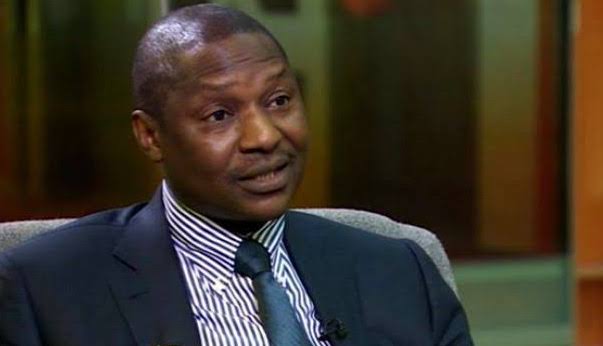Politics
Malami backtracks on remarks about judiciary over delay in prosecution of high-profile cases

The Minister of Justice, Abubakar Malami, has responded to a statement credited to the Chief Justice of Nigeria, Tanko Muhammad on the prosecution of high-profile corruption cases in the country.
Malami had on Monday blamed the judiciary for delays in the prosecution of high-profile cases in Nigeria.
He accused judges of delaying hearing and determination of cases involving Politically Exposed Persons (PEPs) despite the legal framework put in place to speed up criminal proceedings.
The CJN in his reaction described the AGF’s remark on the prosecution of high-profile corruption cases as one-sided.
He said: “The position of the Minister of Justice and the Attorney-General of the Federation, Abubakar Malami (SAN), that the judiciary be held responsible for delays in the trial and delivery of judgements on corruption cases involving politically exposed individuals appears to be one-sided.”
However, in a statement issued by his Special Assistant on Media and Public Relations, Dr. Umar Gwandu, on Wednesday in Abuja, Malami said the Federal Government believes in the separation of powers amongst the three arms of government.
The statement read: “It was an innocent statement aimed at showing and re-enactment of the tripartite division of powers and responsibilities among the Executive, Legislature, and Judiciary.
“The Federal Government maintained the sanctity of the provisions of sections 4, 5 and 6 of the 1999 Constitution of the Federal Republic of Nigeria that delineate the roles and responsibilities of the executives, legislature and judiciary.
READ ALSO: Malami accuses South-West govs of dishonesty in Magodo land case
“It is on this note that the Federal Government supported the review of Section 121(3) of the Constitution of the Federal Republic of Nigeria to accommodate the provisions for financial autonomy of the state legislature and judiciary.
“In addition to the Constitutional provisions, the Federal Government also came up with the Executive Order 10 to enforce the provision of autonomy of State Legislature and Judiciary.
“It is on the record that the Buhari-led Federal Government has a record of non-interference with or meddling into the affairs of the legislature and judiciary.
“The doctrine of separation of powers has three implications: that the same person should not be part of more than one of the arms or division of government;
“That one branch should not dominate or control another arm. This is particularly important in the relationship between (the) executive and the courts;
“That one branch should not attempt to exercise the function of the other.”
Join the conversation
Support Ripples Nigeria, hold up solutions journalism
Balanced, fearless journalism driven by data comes at huge financial costs.
As a media platform, we hold leadership accountable and will not trade the right to press freedom and free speech for a piece of cake.
If you like what we do, and are ready to uphold solutions journalism, kindly donate to the Ripples Nigeria cause.
Your support would help to ensure that citizens and institutions continue to have free access to credible and reliable information for societal development.






















